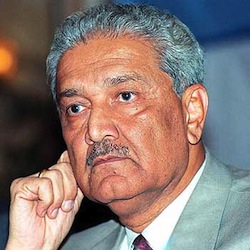Khan Details Iran's Historical Efforts to Get Bomb
March 15, 2010
Featured Image
We are happy to serve you a daily summary of the day's top nuclear policy stories each morning, with excerpts from the stories in bullet form.
Stories we're following today:
Pakistani Scientist Khan Describes Iranian Efforts to Buy Nuclear Bombs - The Washington Post [link]
- The father of Pakistan's nuclear weapons program has written an official account that details an Iranian attempt to buy atomic bombs from Pakistan at the end of the 1980s.
- Bombmaker Abdul Qadeer Khan states in documents obtained by The Washington Post that in lieu of weapons, Pakistan gave Iran bomb-related drawings, parts for centrifuges to purify uranium and a secret worldwide list of suppliers.
- Khan's narrative calls into question Iran's long-standing stance that it has not sought nuclear arms.
- The account also conflicts with the Pakistani government's assertion that Khan proliferated nuclear know-how without government approval.
Debate Grows on Nuclear Containment of Iran - The New York Times [link]
- Prominent strategists like Zbigniew Brzezinski argue forcefully that [containment strategies that] worked in the cold war will work with the mullahs.
- The White House denies that nuclear containment is on the table.
- So what is the argument for containment? Basically, it assumes that if China and Russia changed over decades, so might Iran. And nuclear weapons can handcuff a nation as easily as they can empower it.
- Brent Scowcroft, the national security adviser under Presidents Gerald Ford and George H. W. Bush warns: “The biggest risk is that it will start an eruption of proliferation” around the Gulf, starting with Turkey, Saudi Arabia and Egypt."
Confronting a Nuclear Tipping Point, an Interview with Former Secretary of State George Shultz - Council on Foreign Relations [link]
- Shultz sat down for an interview with CFR to discuss the prospects for disarmament and the dangers of accelerated proliferation.
- On the idea of zero: "We've come a long way and, in a sense, we've won the rhetoric battle. People now are all saying, 'Yes, we agree on this objective.'"
- Shultz went on: "So now comes the battle of action. Iran has to be confronted; North Korea has to be confronted; the nuclear fuel cycle has to be confronted, and so on."
- Shultz highlighted the issue's bipartisan support: "President Obama has taken this up very strongly and well. It's also very important to take note of the fact that Senator John McCain, who supported this idea during the election campaign, made a powerful speech on the floor of the Senate last June."
What Solution on Iran? - Andrew Lebovich in the Washington Note [link]
- As debate on Iran continues to stagnate, there is still the ever-present fear that something will snap in the Middle East, and war could break out in the event that Israel decides to act on Iran, with or without American help.
- It is in this context that I took another look at former Bush Undersecretary of State for Public Diplomacy James K. Glassman and Michael Doran's Wall Street Journal op-ed from January, arguing for a "soft-power" solution on Iran.
- [Such a solution would include] a combination of sanctions, support for the Green Movement, and strategic communications helping create a situation in Iran that is more favorable to the U.S. and its allies.
- While I hesitate to accept this view or advocate for regime change in Iran, whether through force or soft power, Glassman's idea that the U.S. should be using all of its tools on Iran is an important one that deserves more attention.
NKorea to Rejoin Nuclear Talks in April - The Associated Press
- The North has said it will only return to the talks — which involve the U.S., South Korea, China, Russia and Japan — after the sanctions are lifted and it holds peace talks with the United States on formally ending the 1950-53 Korean War.
- The U.S. and South Korea have responded that the North must first return to the negotiating table and make progress on denuclearization.
- An unidentified North Korean official in Beijing said Pyongyang will return to the six-way talks in early April and "present its idea to move forward denuclearization," South Korea's JoongAng Ilbo newspaper reported Saturday.



